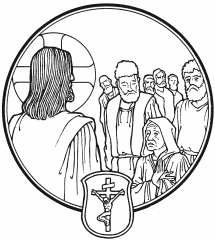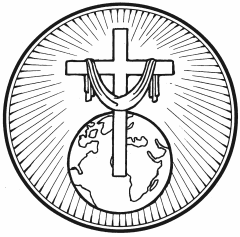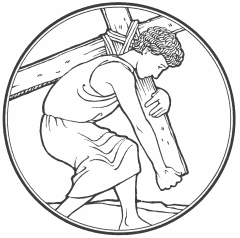 Grace, mercy, and peace to you from God our Father, and from our Lord and Savior, Jesus Christ, amen. The text for the sermon is the Palm Sunday Procession from John 12:12-19.
Grace, mercy, and peace to you from God our Father, and from our Lord and Savior, Jesus Christ, amen. The text for the sermon is the Palm Sunday Procession from John 12:12-19.
The next day the large crowd that had come to the feast heard that Jesus was coming to Jerusalem. So they took branches of palm trees and went out to meet him, crying out, “Hosanna! Blessed is he who comes in the name of the Lord, even the King of Israel!” And Jesus found a young donkey and sat on it, just as it is written, “Fear not, daughter of Zion; behold, your king is coming, sitting on a donkey’s colt!”
His disciples did not understand these things at first, but when Jesus was glorified, then they remembered that these things had been written about him and had been done to him. The crowd that had been with him when he called Lazarus out of the tomb and raised him from the dead continued to bear witness. The reason why the crowd went to meet him was that they heard he had done this sign. So the Pharisees said to one another, “You see that you are gaining nothing. Look, the world has gone after him.” Here ends our text.
Today marks the beginning of Holy Week. The city of Jerusalem is abuzz with the preparations for the Feast of the Passover, a celebration in remembrance of what God had done for His people when they were slaves in Egypt. As Moses tried to get Pharaoh to release God’s people, Pharaoh would agree to their release, only to have his heart hardened. God had sent a series of plagues to make Pharaoh release the Israelites, only to have the whole ordeal repeat itself. Finally, God unleashed the tenth and final plague: the death of the firstborn. The Israelites were instructed to mark the doorposts of their homes with the blood of a spring lamb and, upon seeing this, the Spirit of the Lord passed over these homes.
On Friday, Jesus had arrived at Bethany. As John records for us, “When the large crowd of the Jews learned that Jesus was there, they came, not only on account of him but also to see Lazarus, whom he had raised from the dead. So the chief priests made plans to put Lazarus to death as well, because on account of him many of the Jews were going away and believing in Jesus.” Needless to say, there was quite of following on account of Jesus and what He had done raising Lazarus from the dead. The news had spread that Jesus was in Bethany and large numbers of people headed there to see Him. With the pilgrims in Jerusalem getting ready for the Passover, it wasn’t long before a great crowd had gathered. Besides that, their curiosity was doubly piqued, since they could also see Lazarus, whom Jesus had raised from the dead.
As Jesus made His way from Bethany to Jerusalem, not only did you have the usual traffic of people going there for the Passover Feast, but you also had the crowd following Jesus. As Jesus arrived in Jerusalem, there was a different feeling in the air. The people began to do something that they normally had not done upon entering Jerusalem: they begun to have a palm procession. This wasn’t just any palm procession that they were having; this procession was for Jesus. They cut palm branches and went out to meet Jesus. They received Him as their king, as the Jewish leaders feared they might.
The people had just one simple message they were shouting: “Hosanna! Blessed is he who comes in the name of the Lord, even the King of Israel!” But what was it exactly were they saying? Hosanna, “save, I pray.” This psalm was one that was sung as part of the Passover feast. Jews sang it when the Passover lambs were sacrificed. Now, they sung it for their Passover Lamb, Jesus Christ, the Lamb of God who takes away the sins of the world, on His way to be their sacrifice. But they weren’t thinking of sacrifice. They received Jesus as heavenly royalty, Israel’s King.
As they were preparing to celebrate the Passover feast, they didn’t even know that their own Passover Lamb was coming to be sacrificed for them. Today, you celebrate your Passover Lamb coming to be slaughtered for your sins.
For you, Jesus had set His face toward Jerusalem. He had an appointment that only He could keep: He had an appointment with the cross. He had come from Galilee preaching and teaching with healing as He went, but ultimately, Jerusalem was the goal of His journey. This sets in motion everything that was going to take place during the week: His betrayal, His arrest, His mock trial, His crucifixion, and ultimately, His resurrection. Everything that was going to take place began with this one moment – His triumphant entry into Jerusalem.
Most of the people who were gathered there that day had no idea what was taking place when Jesus entered Jerusalem, what it meant to them personally. Jesus had taught them that the definition of the Christ is to suffer, die, and rise from the dead on the third day, and yet, they still missed what was taking place here.
Do you understand what is going on here or are you missing it as well? This is meant for you. Here comes your Passover Lamb, to make death pass over you and earn for you everlasting life. This Lamb goes forth uncomplaining, doing the task by which He has been sent: to bring about the salvation for God’s creation. Unlike every other lamb that was brought to the slaughter for the Passover, Jesus Christ not only died to purge from you your sins, He also rose for you as well. He rose triumphant for you, to proclaim your victory over sin, death, and the devil, once and for all. He has opened heaven for all mankind by His blood shed on the cross.
As John records for us, “His disciples did not understand these things at first….” Truth be told, the disciples weren’t alone in not understanding what was going on as Jesus entered. The people were shouting “Hosanna!” but didn’t know why they were shouting it. Nonetheless, it doesn’t take away the reason why they were shouting it. They needed to shout it, just as we need to shout it even today. This is the very reason that He came, was crucified, died, rose from the dead, and ascended into heaven to occupy His kingdom. By His blood and Holy Spirit, He has swept us clean of all filth, so that all who believe in Him are righteous and blessed, and will someday pass through temporal death into His heavenly kingdom.
It is interesting to note what the Pharisees say to one another: “You see that you are gaining nothing. Look, the world has gone after him.” It might have been true at the moment, but would we agree that it is true today? Does the world really go after Jesus or does the world go after something or someone else? Does the world find its salvation in the cross of Christ or is salvation found somewhere else? Maybe a better question to ask is this: do you go after Jesus or do you go after something or someone else? We might find temporary comfort in what this world has to offer, but the comfort that this world gives is fleeting at best. It is here today but gone tomorrow. What Christ has done for you was here yesterday, it is here today, and it will be here tomorrow. The gift of salvation won for you by Jesus Christ on the cross was here yesterday, here today, and will be here tomorrow. We cannot say the same about the false comfort that we receive from the world.
Jesus would fulfill every sacrifice that God had demanded. He would live a sinless life as the Lamb without blemish. He would die the death that was meant for us; a death filled with suffering and eternal separation from God. Instead, we reap from His death on the cross. He gives to us His righteousness in exchange for our sins. It is no coincidence that in the celebration of the Lord’s Supper, we recite the words of Palm Sunday, singing, “Blessed is He that cometh in the name of the Lord. Hosanna, hosanna, hosanna in the highest.” You and I can be thankful that Jesus has gone to Jerusalem to pour out His life, for by this He has forgiven our debt to God and set us free. May we forever sing, “Blessed is he who comes in the name of the Lord.” In Jesus’ name, amen. Now the peace of God that passes all understanding, keep your hearts and minds through faith in Christ Jesus, amen.




